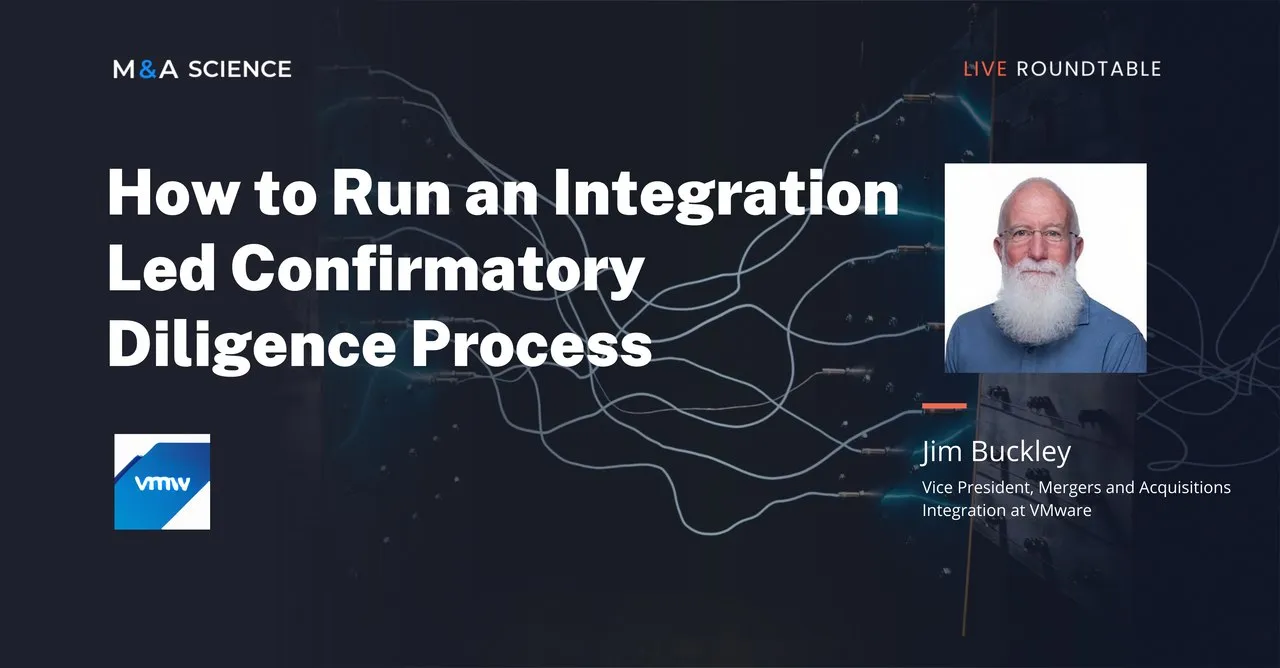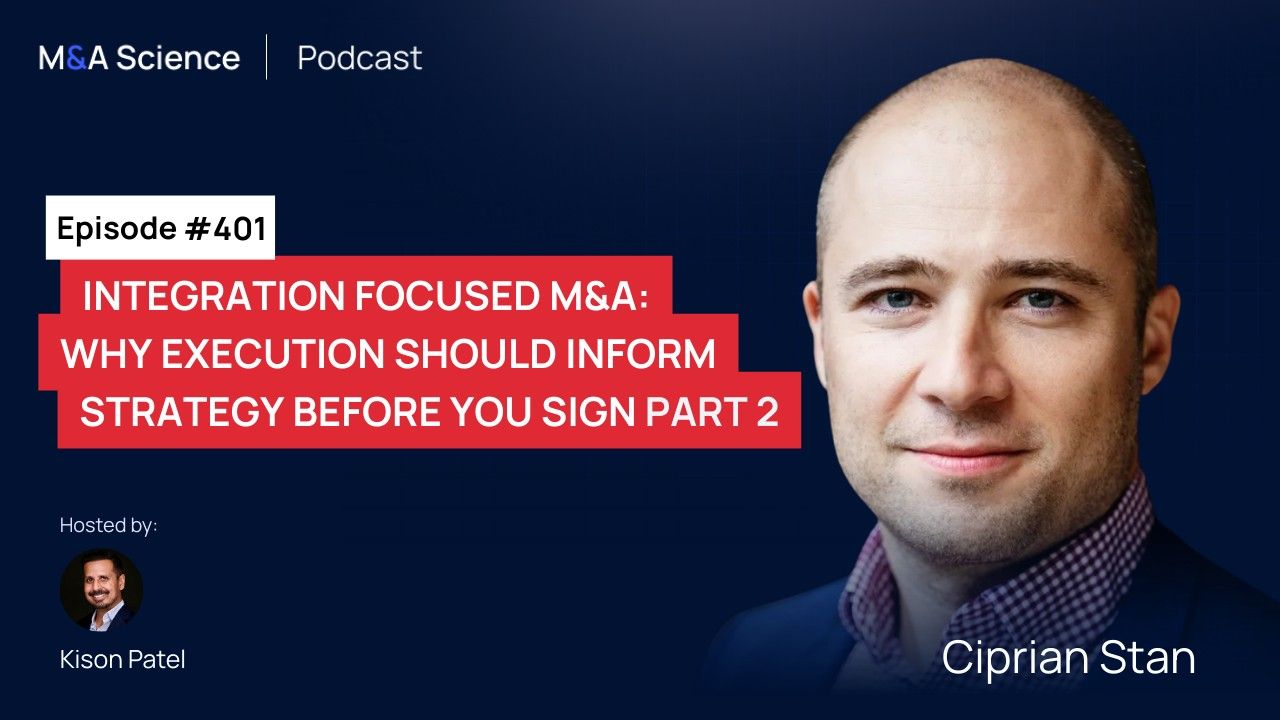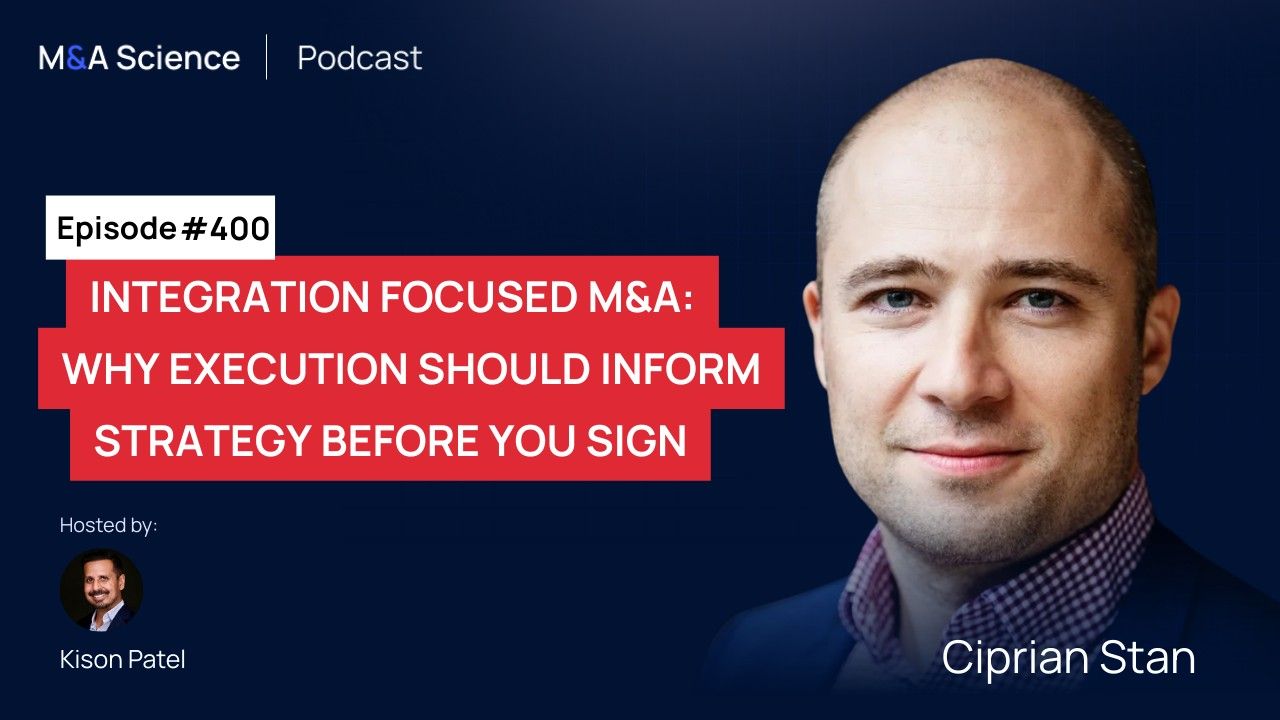
VMware by Broadcom delivers software that unifies and streamlines hybrid cloud environments for the world’s most complex organizations. By combining public-cloud scale and agility with private-cloud security and performance, VMWare empowers customers to modernize, optimize and protect their apps and businesses everywhere. Capable of deployment in the software-defined data center, cloud environments, any app and the enterprise edge, VMWare's comprehensive software portfolio makes global enterprises more innovative, connected, resilient and secure.
Jim Buckley
Jim Buckley is a seasoned M&A expert with a distinguished career in leading integration efforts across the tech industry. Currently serving as VP of Strategy, Planning, and Operations at Omnissa, Jim brings deep expertise in mergers and acquisitions to his strategic role. Previously, as Vice President of M&A Integration at VMware, he spearheaded the integration of some of the company’s largest transactions, including the concurrent acquisitions of Pivotal and Carbon Black. With a background that spans key roles at Microsoft, PayPal, and Mentor Graphics, Jim has led nearly 100 deals, specializing in valuation, due diligence, and business integration, making him a key figure in the tech M&A landscape.
Episode Transcript
Integration led confirmatory diligence process
Having integration lead the process more firmly assures that you're going to create value post-close.
Corp Dev acquires value, integration team creates value. I think it's just that binary.
Having the integration team , at least the lead , early in the process together with HR and finance, gives you access to early conversation that will help you get a picture of what to do with a company post close .
Corp Dev versus Integration running the diligence process
Corp dev is largely transaction led. They go from deal to deal to deal, and that's what they should do. That's what they're supposed to do. They're always looking out for that next deal.
The integration team, it's a bit of a long trudge and you gotta live with it. You got to realize that you got to drink all the Kool-Aid and say, "This is what we're doing. This is what the north star looks like. This is what creating value looks like. Now let's go do it. Do we have all the pieces to do it?"
The biggest difference is Corp dev typically will handoff. And let's say it's a throw-it-over-the-wall process. And during handoff, you can lose a lot of the secret sauce to the point where if you started a hundred percent at the beginning, you could only be at 90 or 85% by the time the integration team gets what they need to understand and know and do something with.
Due diligence is all about stitching together the “why” to the “what” to the “how”. So why are we doing this deal? That's the strategic rationale. What problem does this solve for us? Does it give us instant revenue, great IP, some great talent, regional look, all the things we already talked about?
The integration team's role is to understand the “how”. They can get the “what” in the virtual data room. How do you sell? The diligence team don't ask that question in the due diligence list typically, because it's either going to be N/A response or it's going to be like seven volumes at the encyclopedia Britannica.
What you really want to do a sit across the table from the head of sales or somebody that's really in the know, their proxy, their chief of staff or right arm and ask how do you sell?
- What drives you to be able to hit your revenue numbers?
- What does that process look like?
- How deeply embedded are you guys in product development?
That's where you realize “now I know what to do with your business and our business. I know how to insert tab A into slot B” because it's all about the how.
Outcome versus outputs
Outputs are something that are driven at a tactical level. You ask a question, you get a response, you understand the why, but how you plug the what and the why together.
The integration team is trying to drive an outcome based on all those outputs. So the north star is an outcome. We're going to fully integrate. We're going to partially integrate. What are the drivers of those decisions? Is it cost-benefit analysis?
The thing I don't want to lose is the opportunity to suggest that some of the most important due diligence to be done is on the organic side, the buyer, like you understand how your company works.
I would say most people, if they're rigorously honest, they don't fully understand how their company works.
Better Alignment and Trust between the Companies
Corp dev teams’ charter isn't to have a long-term relationship with the executive team or the board of the target company. They're there to drive the transaction as the buyer from the buyer's side.
The integration team has to have a working and workable relationship with the target company teams, including the CEO, C-level folks, and lastly the team that they're going to be working with for the integration. These people have day jobs and asking too much from them will require a working relationship
And most people are pretty good about it. They want to be helpful. They're curious. They want to be good stewards of the legacy company. And it's an art form, it's all about working relationships.
And that's where I think integration leads are the ones that across all functions, not just the IMO are the ones that have to have that healthy relationship with the folks from the target company.
The integration team is just there to do the right thing. Regardless of what both parties think, they are there to do what's best for the business and that will eventually gain the trust of the target company.
How to have integration lead diligence
You have to involve integration team pre LOI. There's the opportunity to hear the dialogue between the two sides. If the seller didn't really want to sell their business, you would hear about it and that matters.
There's a real advantage to be a fly on the wall in just watch people engage in their conversations during diligence period you will see the people who are not happy about the deal, and you will also see the people who are excited about the transaction.
Most deals make it to close anyways. I'll bet that once a company engage, over 90% make it to close. So why bother confirming the transaction and take that as the opportunity to plan for integration.
People don't like to do this because of trust issues. Not every Corp dev team and integration team have a wonderful relationship. Some of its just company culture. There's that aspect to it where you need to be respectful of confidentiality.
But there are also people who don't think there's a value in having integration lead early. That's why the integration lead needs to communicate properly what he can bring to the table. Everyone should understand that the integration leadd is someone they can trust and the only person who understands most how the companies fit together.
Preparing executives
There are executives who are excited about the transaction and there are executives who doesn't care what happens. It's the integration leads job to get these executives excited and invested in the process.
Confirmatory Diligence Phase
So LOI gets signed, corp dev typically sends the diligence list over the wall and say. And that’s around 800 questions. There's a huge amount of redundancy a lot of times in those questions, which is a little abusive quite honestly. Because you got a team of 20 on the buying side talking to like three people on the other side. The last thing you want them is to answer the same question more than once.
When the integration team leads the diligence questions, it avoids redundancies because they know the right questions to ask. Also, they don't need to hand it off to someone else which makes them a better option.
Working with the functional leads
If the integration lead is leading the process, one of their clients in that process is the corporate development team. one of their job is to inform them of information regarding the valuation because ultimately the integration team isn't going to have a valuation debate with a target. It's going to be the Corp dev team.
They also have to feed the legal team. There are the big confirmatory questions that drive support of valuation, support of key assets, support or do they have any toxic agreements, toxic employment agreements at the very senior levels or commercial agreements?
Those are the sort of things like the acquirer has to make a decision. Do we want to bring those over and remediate and or not? Or do we want them to remediate them before close?
There's an opportunity to keep the team small in the early stages, meaning the early days, literally, or hours of the due diligence process. And then you start to bring in people that overtime again, so you don't overwhelm the target company.
Working with the Target Company
The “how” really leads itself to the integration plan. “How do you sell? What are your platforms in which you start lead generation to quotes to bookings, to the whole lead to the cash life cycle?”
At some point, you have to figure out how the platforms, the policies, and the processes. One of the things that I'm pretty adamant about at VMware is really, nobody gets to say the word platform unless they include policy and process. Because those three, have to travel in unison.
At the end of the day, it's just a big database. It's great technology, but the process and the policies around opportunity management are what really matter.
- Who owns the opportunity?
- How is that determined?
- Who gets to value of that opportunity?
- What are the approval steps from finance and or legal to make sure that opportunity is identified as it goes and becomes ultimately a booking?
- When does that happen?
- How does that happen?
- Who's involved?
That's the sort of thing that's hard to get to in a due diligence process. Most people think it's way too far ahead but it's never really too far.
You will realize that you don't have very many policies or processes and your sales team is going to come in and start selling both your technology and our technology, they're about to get an onslaught tutorial of what our policy and processes are.
At the end of the day, the opportunity management system is just a system. But it's how is it set up to support the processes and policies?
Closing and announcement
I like my teams to build a preliminary integration plan as they're doing due diligence, it doesn't have to be complicated, but it helps me understand that they understand what the goal is, what the ultimate outcome is.
So there's a preliminary integration plan that is developed during this early in the due diligence process as possible. That gets further and formed during the due diligence process so that when you get to close, ideally you have an agreed upon confirmatory confirmed integration plan.
And then people are hitting the road out of the gate. They know what to do. They know who to talk to. They know where the challenges are.
I'm a firm believer that the agreed upon integration should be executed in under 12 months, that's pretty aspirational in a lot of companies. I mean, it doesn't include things like legal entity consolidation and things that just regulatory or otherwise are just really long tails. I'm not talking about that.
But in terms of running the business as part of your business, it shouldn't take more than 12 months to do that.
When you don’t have an IMO
It depends on the size of the deal, complexity of the deal, size of the business, complexity of the business on both sides. It can be done but those are very rare, and I don’t mean in the valuation perspective.
You have to have a really awesome problem solver to be able to do that because a lot of companies outsource it to the consulting firms and they have reading rate processes but they don't have the buyer’s DNA.
Do’s and Dont’s
Don't lie. It's easily caught up in lies, right? People will start hand-waving. I've worked with the company once and they promised to integrate the entire opportunity management system under 6 months. I knew that wasn't possible but they promised it anyways.
There's too much that could go wrong by saying too much, too soon. And that's where alignment and trust is really key on both sides. The integration lead should have that relationship and capability to go to the buying executives and tell them what they can say and what they can't say.
One of the biggest roles of integration is coaching. If you say something, it's sets expectations.
Go-to-Market Integration
The more you treat go-to-market like a unicorn in the process, the more it becomes a unicorn. My approach is you treat go-to-market exactly the same as you treat the rest of the process, what do you sell? How do you sell? You know what, I don't care about your terminally unique cop plants. I really don't. We have people that will deal with that, but that's just math.
There's incentives and then salespeople are wired differently based on comp structures and all that stuff. But when you boil it back down to kind of the basics of what due diligence is supposed to find out, it's like, How do you sell?
This is why i don't like unique. I want everything plain and simple for as long as possible and then you build from there because if you start complicated, the process self complicates overtime. So you go from complicated to super complicated and then you have no idea what's going on.
Customer journey
Integration is really all about two things: employee experience and customer experience. If you solve for those two, the more successful you will be.
If you think about what you're trying to achieve, especially if the deal has revenue, you only need to solve for those two things. And when you put those two things in the front of your brain for as long as possible, you will keep things simple for as long as possible
M&A Software for optimizing the M&A lifecycle- pipeline to diligence to integration
Explore dealroom

Want to wear your M&A expertise?
Check out the M&A Science store.

.webp)



.jpeg)
